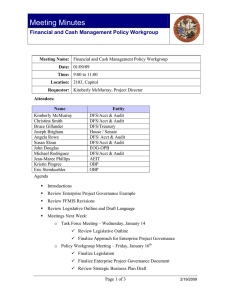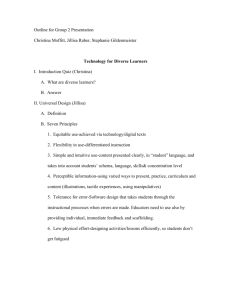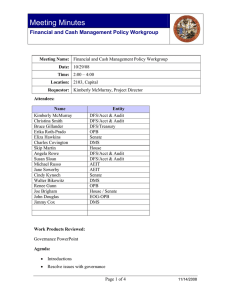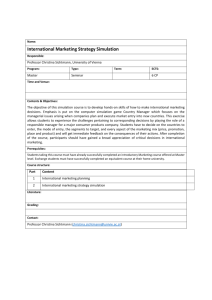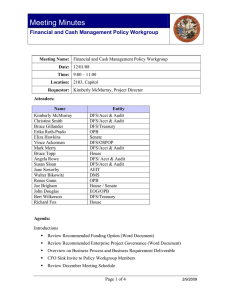Meeting Minutes Financial and Cash Management Policy Workgroup
advertisement
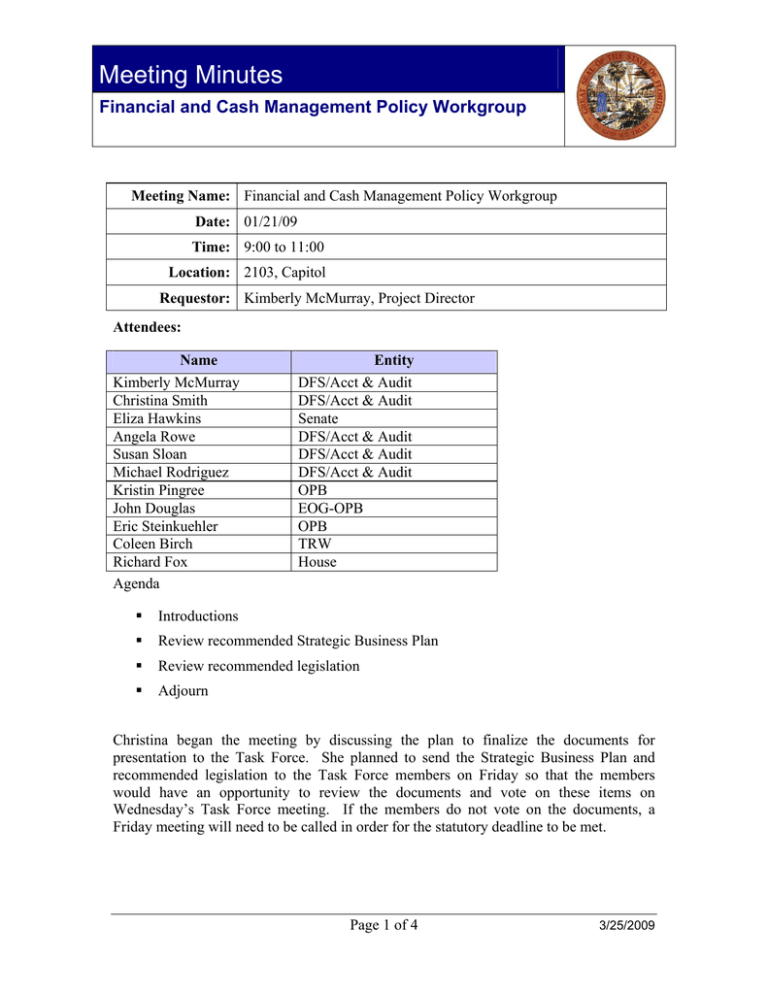
Meeting Minutes Financial and Cash Management Policy Workgroup Meeting Name: Financial and Cash Management Policy Workgroup Date: 01/21/09 Time: 9:00 to 11:00 Location: 2103, Capitol Requestor: Kimberly McMurray, Project Director Attendees: Name Kimberly McMurray Christina Smith Eliza Hawkins Angela Rowe Susan Sloan Michael Rodriguez Kristin Pingree John Douglas Eric Steinkuehler Coleen Birch Richard Fox Agenda Entity DFS/Acct & Audit DFS/Acct & Audit Senate DFS/Acct & Audit DFS/Acct & Audit DFS/Acct & Audit OPB EOG-OPB OPB TRW House Introductions Review recommended Strategic Business Plan Review recommended legislation Adjourn Christina began the meeting by discussing the plan to finalize the documents for presentation to the Task Force. She planned to send the Strategic Business Plan and recommended legislation to the Task Force members on Friday so that the members would have an opportunity to review the documents and vote on these items on Wednesday’s Task Force meeting. If the members do not vote on the documents, a Friday meeting will need to be called in order for the statutory deadline to be met. Page 1 of 4 3/25/2009 Meeting Minutes Financial and Cash Management Policy Workgroup Review of Strategic Business Plan Prior to the review of the document, Kimberly added that we should mark this document as a “draft” since we are still in the process of making necessary revisions. Christina briefly discussed the table of contents and started the review of the document by highlighting the new areas, which are as follows: • The Strategic Business Plan has been renamed as the “Strategic Enterprise Business Operation Plan”. Christina noted that the new name was based on discussions held with our attorneys, who suggested that we narrow the scope of the plan. This plan goes into the operational level, so we felt it was important to highlight this aspect in the name of the plan. • Section 2.2, page 8 – Deficiencies in Governance – The table that summarizes the entities does not include the Council on Efficient Government. Christina told the group to let us know if they felt as though this entity should be included. • Section 2.2, page 9 (beginning with the second paragraph) – Initially there was some sensitivity as to how the ineffectiveness of the FMIB and Council should be listed within the document. The wording is considered to be lightweight and does not appear in the governance document; however, Christina mentioned that the group should let us know if the wording should be changed. She said that we need to discuss the deficiencies in our governance structure and make one person accountable. • Section 2.3 – Customizations of Business Processes: This entire section comes from the group working on analyzing customizations. They evaluated a lot of technical detail from Project Aspire. • Section 2.3.4, page 13 – Customizations by Cause and Core Business Function: The table represents the business processes that had the most customizations and the causes for each of the customizations. • Section 2.4 – Funding Challenges: contains the same verbiage. • Section 3 – The Strategic Plan is outlined throughout this section. The new verbiage entails the development of a business case as a requirement. • Section 3.1.3, page 18 – Enterprise Financial Business Operations Officer: The last bullet was added with the intent to allow the Officer to enforce the issues. These issues can be elevated to the Governor and Cabinet when necessary. • Section 3.4, page 25 – Implementation of Successor Financial and Cash Management System: This section lays out a road map for items that should be This has been restructured; however, it Page 2 of 4 3/25/2009 Meeting Minutes Financial and Cash Management Policy Workgroup completed prior to beginning the next project; however, this does not represent a conclusive list. • Section 3.4.3, page 29 – Establish Project Governance: Certain issues must be raised to the enterprise level, which is discussed in this section. While reviewing the Strategic Plan, the group discussed a few items. First, the group made an inquiry about how we would handle a situation in which the Officer is recruited from another state and he/she receives heavy solicitation from vendors. How would we handle the external influence that the vendors may have on the Officer? Christina responded by reminding the group that AEIT is present to also elevate issues to the Governor and Cabinet if the Officer isn’t raising certain issues. She added that if the Officer continues to refrain from properly elevating issues then we need to look at replacing the Officer. In essence, the Governor and Cabinet need to have confidence in the Officer and the decision of who is appointed as the Officer and how accountability is enforced will be paramount to the success of the governance structure. Christina also mentioned that we are not dictating a project governance structure; rather we are making a recommendation on project governance. Secondly, some group members expressed concern over the release of funding without prior approval of a project governance structure. Christina responded that the project management plan cannot be fully documented until a vendor is secured. The vendor would assist in structuring process teams and the escalation structure within the project. Review of Legislation Christina began the discussion by mentioning that the legislation being presented was in draft form since the legislation is being reviewed by our attorneys. Based on the legislative outline discussed at the last Task Force meeting, the following items were revised: • “Agency” was replaced with “Office” • Issue with the verbiage “administratively housed within DFS” (need suggestions from group on better language to communicate that the Office needs to adhere to the Department’s policies for administrative and purchasing functions) • Changed wording to reflect that the Governor and Cabinet are the head of the Office There was discussion from the group as to whether to list the newly created entity as an “Office” or a “Commission”. Christina believed that “Office” appears to be a more permanent establishment. Page 3 of 4 3/25/2009 Meeting Minutes Financial and Cash Management Policy Workgroup Christina mentioned that agencies are discussed in the FMIS language on page 9 since agencies are required to provide information to the FMIS. She thought that we should add that the agencies need to comply with how the information is submitted. There is a perceived problem that once the policy is issued it will drive when agencies re-engineer to comply with the policy. Christina explained that we need to put “teeth” in the statutes for agencies to comply and we need to better define the policies, specifically the definition and who needs to comply with the policy. The group addressed the issue of the appointment and re-appointment of the Officer, which was listed on lines 39 and 40 of the draft legislation. Some group members were undecided as to the term of the Officer. Christina suggested that the term should be 4 to 5 years; however, she listed 3 years in the draft legislation. Group members inquired about how voting would be handled on issues other than the appointment/re-appointment of the Officer. The voting mechanism for other issues is not addressed in the draft legislation. Christina believed that the Governor and CFO must be willing to agree on other issues elevated to the Governor and Cabinet in order for the governance structure to be effective. Finally, the group discussed the consistency of naming conventions with respect to the Officer and Council. There were suggestions that the Council is formally titled “Enterprise Financial Business Operations Council”. This change would also require us to revise the title of the Sub-Council and we would need to make sure the titles are fixed throughout the Strategic Plan and legislation. The meeting was adjourned. Page 4 of 4 3/25/2009
